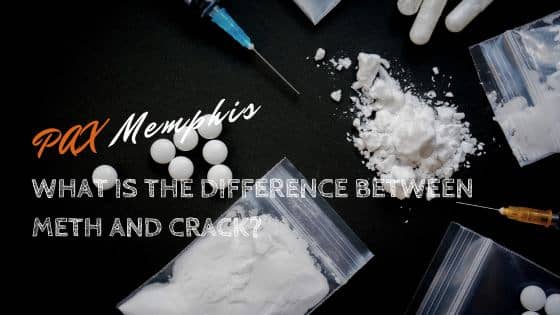According to the Department of Health and Human Services (HHS), 61.2 million people abused illicit drugs in 2021.[1]
Each illicit substance is different, causing a wide variety of effects. However, some substances can make you feel very similar. For example, both methamphetamine and crack cocaine are stimulant drugs that can cause a heightened sense of energy, a rush of euphoria, and even paranoia.
While crack and meth are known to cause similar effects, there are some crucial differences to be aware of. If you are worried that someone you love is abusing either of these drugs, please speak with our team of addiction specialists today about finding the treatment you deserve.
What is Meth?
Meth is a potent stimulant drug that comes in many forms, including pills, powder, and a crystal-like substance. According to the National Institute of Drug Abuse, “Methamphetamine has been classified by the U.S. Drug Enforcement Administration as a Schedule II stimulant, which makes it legally available only through a nonrefillable prescription.”[2] While methamphetamine might be used medicinally under the brand name Desoxyn, it is rarely prescribed because of its ability to cause addiction.
Side effects of meth include:
- Increased heartbeat and breathing rate
- Heightened blood pressure
- Elevated body temperature
- Increased energy
- A rush of euphoria
- Anxiety or paranoia
- Aggressive and violent behaviors
- Tremors or uncontrollable shaking
- Cardiovascular issues like strokes or heart attack
- Convulsions
- Overdose and death
The immediate effects of meth can last for up to 8 hours. The long-term effects can be severe and concerning, including issues like delusions, paranoia, aggression, and changes in brain functioning.
What is Crack?
Crack, or crack cocaine, is an extremely addictive stimulant drug that is derived from cocaine. Crack cocaine is made by dissolving powdered cocaine in a mixture of water and ammonia or sodium bicarbonate (baking soda). The mixture is boiled until a solid substance forms, and then the solid is removed from the liquid, dried, and then broken into chunks (rocks) that are sold as crack cocaine.[3]
While crack is relatively easy to make and cheap to buy, it is incredibly dangerous. Common side effects of crack cocaine include:
- A rush of euphoria
- Increased energy and alertness
- Paranoia
- Heightened sensitivity to sound, light, and touch
- Dilated pupils
- Rapid heartbeat and high blood pressure
- Irritability or anxiety
The immediate effects of crack only last for a few minutes, so people typically binge on the drug, using it over and over for a period of time. Long-term crack abuse can lead to an array of adverse side effects on every area of your brain and body, such as psychosis, heart damage, lung issues, and even malnourishment.
What are the Main Differences Between Meth and Crack?
While crack and meth are both potent stimulant drugs that are highly addictive and damaging to the body, they are not the same substance.
For starters, crack is derived from cocaine, which comes from coca leaves. On the other hand, methamphetamine is a synthetic drug, meaning people create it using hazardous substances and household cleaners instead of organic chemicals.
One of the main differences between meth and crack is how long the effects last. Methamphetamine causes long-lasting effects, sometimes for up to 8 hours. (https://sharonsteelerealestate.com/) However, crack cocaine usually only lasts for up to 8 minutes, causing people to binge on the drug to maintain their high.
Neither drug is regulated when you are buying them off the street, so there is no way to tell how potent your meth or crack is. As a result, abusing either of these drugs puts you at a serious risk of overdose and unwanted side effects.
Signs of Stimulant Drug Abuse
If you are worried your loved one is abusing meth or crack, being aware of the signs that someone is abusing these substances can help you determine your next steps.
Signs of meth abuse include:
- Not sleeping for long periods
- Experiences a crash (periods of depression, fatigue, and cravings for meth)
- Skin sores
- Irritability and paranoid behavior
- Significant weight loss
- Poor motor skills
- Memory issues
- Hallucinations from lack of sleep
- Severe dental decay
Signs of crack cocaine abuse include:
- Aggression and irritability
- Paranoia and anxiety
- Heightened alertness and extreme energy
- Lowered appetite
- Rushes of euphoria
- Dilated pupils
- Hallucinations
- Appearing intoxicated for short periods
Whether your loved one is abusing crack or meth, addiction treatment is necessary.
Finding Help for Meth or Crack Abuse and Addiction Today
If you or a loved one abuse meth, crack, or a combination of the two, it’s time to seek help. At PAX Memphis, we can connect you with a drug rehab center that can help you pave the way for long-term recovery.
To learn more about how we can help, contact PAX Memphis today.
References:
- The Department of Health and Human Services (HHS): SAMHSA Announces National Survey on Drug Use and Health (NSDUH) Results Detailing Mental Illness and Substance Use Levels in 2021, Retrieved June 2023 From https://www.hhs.gov/about/news/2023/01/04/samhsa-announces-national-survey-drug-use-health-results-detailing-mental-illness-substance-use-levels-2021.html
- The National Institute of Drug Abuse (NIDA): What is Methamphetamine, Retrieved June 2023 From https://nida.nih.gov/publications/research-reports/methamphetamine/what-methamphetamine
- The Department of Justice (DOJ): Crack Cocaine Fast Facts, Retrieved June 2023 From https://www.justice.gov/archive/ndic/pubs3/3978/index.htm
Medically Reviewed: September 25, 2019

All of the information on this page has been reviewed and verified by a certified addiction professional.










